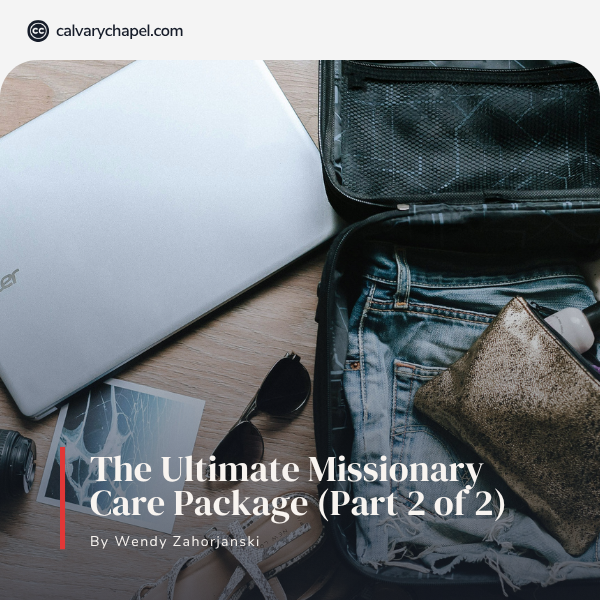
We have been packing the ultimate missionary care package together. The first step was learning what to pack in your heart. The next section is going to be much more practical as you see what is helpful to pack in your suitcase.
What to Pack in Your Suitcase:
1. Treats
This is a non-essential, but also an easy way to bless missionaries. Bringing a special treat from their home country (if that is the one you are coming from) or your home country will put a smile on their face. This could be a sweet treat, a favorite coffee, or a small non-edible gift. It does not need to be expensive or a lifetime supply; it is the thought that counts. If you are in contact with the missionaries beforehand, feel free to ask them what treats would be special for them or if you are not communicating directly with them, do some research. Are there any people in your church or community with missions experience? Maybe they would have suggestions for a fun treat to pack.
If all else fails, just get a simple universal gift. Years ago, several ladies from Scotland visited us. We had never met them, but when they arrived they gave us a teabag dish and dish towel with common Scottish phrases written on it and what they mean. Now, every time I use those items, I think of them and the time we shared together. When visiting strangers, a small gift that somehow ties to the place you are from is special.
2. Gift for the Children
The other thing the Scottish ladies brought was a book for our son. Paying attention to someone’s children is a sure way to bless them. Again, it does not need to be expensive. The Scottish ladies mentioned above brought a book or two for our soon-to-be-born son, and I remember being really touched that they thought of him. He is seven years older now, but even still, when someone visits and pulls a little present out of their bag for him, it puts a smile on my face. Bonus points if you can bring something that you know they like. This is not always possible, but asking a friend who has a child/children a similar age for suggestions is a great place to start. I remember a friend of mine telling me how they recently had a visitor come and he brought a present for each of her two children. For one he brought a soft, fluffy stuffy because he knew one child loved soft, fluffy things, and for the other he brought all different kinds of fruit because he knew she loves fruit. This was not his first visit and he had been listening on previous visits to learn what the children liked, so he was able to nail each present. If you really have no clue what to get the children you are visiting, another suggestions would be to wait until the end of your trip to buy them a little gift. Maybe after spending a few days with them, noticing what they play with or talk about, will lead you to the perfect little present.
3. Money
Something that is not optional, as gifts are, is having an adequate budget for your trip. Coming with a realistic budget can relieve stress, both for you and your host. It is difficult to know how much money to have on hand when traveling to a place for the first time and money can be an uncomfortable thing to talk about, but asking your host how much money to budget for food, essential personal expenses, and transportation is good practice. Ask if there will be any other expenses that you have perhaps overlooked. If you need a visa to enter the country, how much does it cost? Is it best to bring cash or use an ATM once you arrive? If you plan to bring cash, is it possible to exchange money in the town/city you are visiting? If the missionaries are hosting you in their home, contributing toward food or taking them out to eat can help offset the extra expense of hosting. Often trips do not go exactly according to plan and budgets are not science, but from my experience with hosting teams and guests, those who asked the most questions were the most prepared and the least stressed about money matters during their visit.
4. Eyes
Okay, not something you can pack in your suitcase, but worth including: Keep your eyes peeled for ways to serve or needs you can meet while on your trip as you pray for discernment and the Holy Spirit’s leading. Are their dirty dishes in the sink after an event, wash them. Doing little things like that throughout a visit add up to blessing. It could be offering financial support to meet a practical need you see or it could have nothing to do with financial support. It could be offering a service or a skill. I heard a story of an artist who while visiting missionaries offered to paint a mural for the local elementary school. The school was excited about this as well as the missionaries, and her idea ended up being a blessing for the entire community. I especially like that example because the lady used a skill which was also a passion in order to bless her host. What skills to you have? What are you passionate about? There are so many creative ways to meet a need and bless those you are visiting, so keep your eyes peeled and brainstorm with your hosts. Skills and passions can meet personal/communities’ needs in powerful ways.
Now we have explored what to pack in your heart and what to pack in your suitcase, but, truth be told, some things are best left at home. Let us see what they are:
What to Leave at Home:
1. Promises You Cannot Keep
This is good advice, even if your toes never cross a border. Be very careful about making promises. This is a hard one for those of us who get excited in the moment and say things like, “Let’s keep in touch. I’ll be sure to write you,” or “We should totally hang out again next week before I go home,” or “It would be so fun if you came to visit me. We should totally make it happen,” or “I just love it here; I’m definitely going to visit again next year.” These can seem like harmless statements, but it can be very hurtful when someone forms a friendship with you during your stay, but as soon as you leave, you start breaking your promises. It is hurtful when you promise to keep in touch with someone after returning home, only to write once and never again. Part of being a disciple of Jesus is being disciplined in our speech. I feel very inadequate to write on this topic because following through on promises is a weak area for me, so I am writing to myself as well as you. It is not easy to tame a flipant promise-making tongue, but it is important to keep your word. If you offer to help someone by bringing something for them, like a book or ministry supplies, bring it. If you promise to stay in contact with someone, write them back regularly. Sometimes it is better not to promise at all. Other times, rephrasing to, “I can’t promise, but I can try to …” might save you from damaging a relationship with a host or new acquaintance.
2. Questions about the Weather
It is certainly fine to ask about the weather, but do not stop there. When a visitor asks me about the weather here, and after I answer does not seem to have any other questions for me, it gives me the impression that they are not interested in learning about the place I live, the ministry I do, or me as a person. We have already talked about question asking in part one, but surface questions that do not lead to deeper conversation are best left at home. Missionaries long for someone to visit who is interested in learning about the place they live, the people they serve, and their own life experiences. A lady visited our church a couple weeks ago and even though she had never once visited our city or church, managed to have several short but meaningful conversations that morning. I had met her once before, so she already knew something about me, but later I found out that she talked to another lady she had never met before and somehow entered into her life and story in a matter of minutes. She did that by asking questions. Not all of us are able to connect so quickly, but we can try and we can learn. Active listening is a skill that can be developed.
3. Advice about Things You Have Never Tried
Exchanging experiences, problem solving as a group, brainstorming, and the like are all very helpful. Receiving a new perspective can bring encouragement, new ideas, and fresh vision. Receiving advice from someone who is convinced they have the answer to a problem, without knowledge/experience of your ministry context, is not. An example might be helpful. Let us imagine that I was showing someone our community garden. As we walk through it, this person says, “Oh, you know what you need to do here? You really need to put a better fence up. Deer and rabbits are going to come in and eat everything. It’s gonna be a huge problem. You also need to make sure that you water your tomatoes every day. They absolutely have to be watered every day.” It is a silly example, but it illustrates my point well. We may have rabbits where I live, but I have yet to see a wild one, and deer have never entered our garden. Our fence has a single rail in order to create a visible border for our dog to see and stay on the other side of. The garden is also next to a stream, so watering tomatoes every day is unnecessary, unless temperatures soar above 100 degrees, because the water table is only a few feet underground. The person giving advice may mean well, but their advice is not helpful. They do not understand the context they are trying to speak into. Make an effort to understand your host, their context, and their ministry by investing in your friendship with them. It is, after all, easiest to receive advice from friends we know and trust.
4. Camera
This is a tricky one that takes discernment. Taking pictures is not bad. People are constantly taking pictures of the things they see and experience in order to share them with others. Taking pictures also shows that we care about something. Taking a selfie with someone probably means we want to remember them. Taking a picture of food we are eating probably means it is either beautifully served or delicious. Sometimes, however, taking pictures can become a distraction and that invisible line between documenting and distraction has to be worked out in the heart in prayer. Why are you taking pictures? Often I hear a visitor say, “Oh, I gotta take a picture for my wife. She would love this.” For me, that is a lovely reason to take pictures, and usually the pictures they take are of food, the church space, our dog, us, or a person they met and talked with. And usually they ask permission.
Sometimes, however, a visitor will come and take pictures in an inappropriate way. The example I am about to give is my personal opinion, and I realize that other missionaries might have completely different views, so talking to your host is essential. But for me, in my context, it is inappropriate to take pictures of someone being prayed over, or of a member of your team talking to a stranger on the street during street evangelism. There are different ways to document what ministry you or your team were involved in without invading someone’s privacy. Taking pictures of children could also fall in this category, so ask permission beforehand. Pictures are powerful and I understand that you might need to have some pictures to share with those who are supporting your trip, but do not make the lives of the missionaries you are visiting into a show and tell. Do not use your camera to show off the amazing ministry that you did overseas. Pictures are a tool that bring to life ministry and reality that is difficult to put into words. And there is a place for pictures, but double check your motives for taking them and ask permission.
That was quite a list! Hopefully after reading this, your mind is not racing in panic about your next trip, but more settled as you feel better equipped to pack what you really need and leave behind what you do not. Even if you do not end up packing the ultimate missionary care package, I know that anyone willing to read an article like this, pray over what is to be gleaned from it, and try their best to implement what they have learned, will be a true blessing to whomever they visit. So off you go; pack that suitcase!







